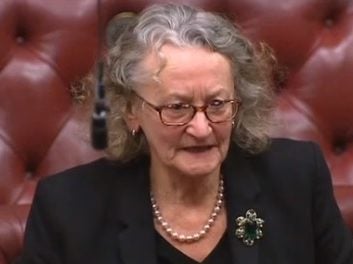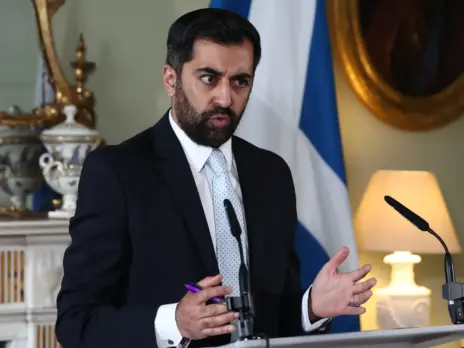
The Government will look again at proposed counter-terrorism powers that campaigners have warned would enable border security officers to seize journalistic material without legal process.
The Counter-Terrorism and Border Security Bill would allow officers to stop, search and detain anyone at the UK border, without grounds for suspicion, to determine if they are a threat to national security.
This section of the bill, which is currently going through Parliament, has no protection for journalists or journalistic material.
Baroness Jenny Jones proposed an amendment in the House of Lords yesterday that would give journalists the right to refuse to hand over confidential information which could reveal the identity of a source.
The Green Party peer said: “We have to amend this provision in some way.
“The alternative is that we pass a measure that we know has already been declared in breach of the human rights convention and is certain to be declared so again.”
Baroness Jones was referring to David Miranda, who was detained at Heathrow Airport for nine hours under the Terrorism Act in 2013. His electronic equipment, including a hard drive carrying thousands of encrypted documents leaked by Edward Snowden, was confiscated.
Miranda was carrying the documents for his partner, the former Guardian journalist Glenn Greenwald. The Court of Appeal ruled in 2016 that the Metropolitan Police breached European law with his detention.
Baroness Jones said the bill’s powers “do not protect journalists, and expose their sources to interference by the state”.
She said her amendment would give journalists the right to say no when asked to hand over confidential information, but added: “I recognise that this is a sticking plaster for now.
“The Government can and should bring their own amendment to resolve the issues in the Miranda judgment, and give proper judicial oversight of this kind of confiscation.”
Lib Dem peer Lord Brian Paddick said he supported Baroness Jones in principle, but warned that “to allow someone to refuse to hand over the documents or information on the basis that this is what they contain, would be open to abuse by foreign spies, or people who have adverse intentions towards the United Kingdom”.
Labour peer Lord Roy Kennedy added: “It is about getting the balance right between protecting our country, protecting the rights of journalists and keeping ourselves safe and secure.”
Home Office Minister Baroness Susan Williams agreed to look again at protections for journalistic material, telling the house: “I recognise the force of the noble Baroness’s arguments on the need for strong protections for journalistic material that is not confidential.”
She said she would ask officials to consider “if any additional protections may be introduced” through Schedule 3 of the border security codes of practice.
However, she said this section of the bill includes a number of safeguards to protect confidential journalistic material, including that grabbing this information requires approval from the Investigatory Powers Commissioner “who must be satisfied that certain conditions are met before granting that authorisation”.
She added: “This approach protects the work of legitimate journalists and lawyers and is consistent with the Court of Appeal’s judgment in the Schedule 7 case of Miranda.”
Baroness Jones agreed to withdraw her amendment in the expectation that her concerns will be addressed.
The debate came days after nine journalism professors and press reform group Hacked Off jointly said the bill could “limit the ability of the press to hold power to account” by putting confidential sources at risk.
An open letter published by the Financial Times, also signed by Miranda’s lawyer Kate Goold and Open Democracy editor-in-chief Mary Fitzgerald, said: “These laws threaten journalists, their sources and the public interest journalism they yield.
“The Government is eager to talk up their support for newspaper publishers. But this bill suggests that they are considerably less interested in the welfare and freedom of working journalists.”
Hacked Off director of policy Nathan Sparkes echoed the letter in a separate statement, urging the Government to change course and “ensure journalists and sources are adequately protected”.
He said: “The Government claim to be supportive of press freedom, yet this bill would allow journalists to be held at borders and forced to hand over confidential information – without grounds for suspecting any wrongdoing.
“Journalists often need to travel across borders in possession of highly sensitive documents or information for publication.
“If this bill is not amended, it will put investigative journalism into serious jeopardy while also making it more dangerous for people to come forward about abuses of power.
“Journalists must be allowed to carry out their work without fear of confidential journalistic material or the identity of their sources being exposed.”
In a statement following the Lords debate, Sparkes added: “The Government’s commitment to look again at the lack of protections for journalists from these powers is welcome, although it remains to be seen whether an improved Code of Practice will be sufficient to provide journalists and their sources with the protection they need.”
Earlier this month peers created clearer journalistic exemptions for new offences within the bill of viewing terrorist material online and travelling to areas designated as a terrorist threat to the UK.
Picture: Parliament TV/Screenshot
Email pged@pressgazette.co.uk to point out mistakes, provide story tips or send in a letter for publication on our "Letters Page" blog






